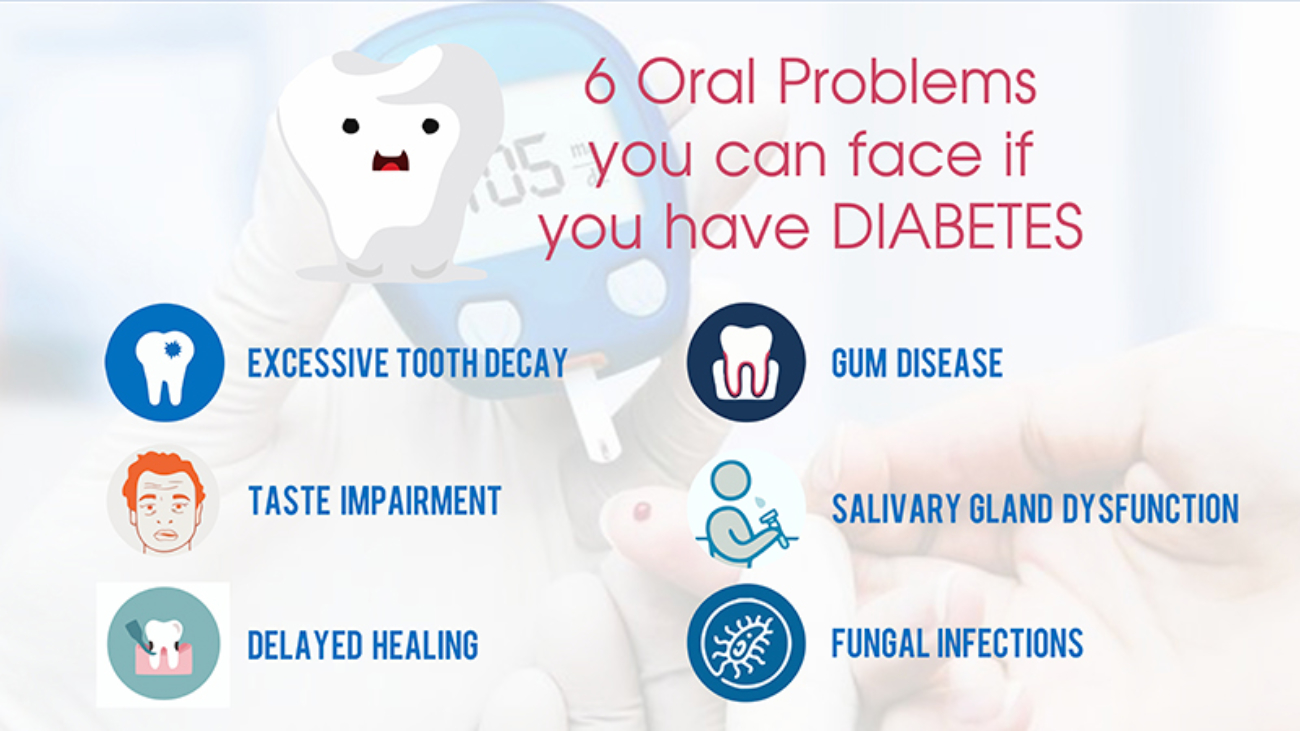Oral Health Care and Diabetes
Oral complications in a patient suffering from diabetes mellitus can be devastating. These may include periodontitis, gingivitis, candidiasis, dental caries, tooth loss, lichen planus, neurosensory disorders(burning mouth syndrome), salivary gland dysfunction and xerostomia and taste impairment.
ORAL IMMUNOLOGIC AND INFECTIOUS DISEASES IN DIABETES
- Periodontal disease:- It is well documented that periodontal disease is one of the main reason for tooth loss among individuals with diabetes. Also, severe periodontitis may increase the risk of poor glycemic control.
- Salivary gland dysfunction:- salivary function is very important for the maintenance of oral and systemic health. Reduced salivary function leads to dry mouth (xerostomia), which eventually cause dental caries due to reduced buffering action of saliva.
- Dental caries:- It is very important to know that patients with Diabetes mellitus are susceptible to other oral conditions, such as periodontitis, salivary gland disorders as already discussed above.
- Oral mucosal disease:- Diabetes is also associated with the development of certain oral soft tissue lesions. These associations may be due to chronic immunosuppression, delayed healing and/or salivary gland dysfunction.
- Neuropathy consequences in the oral cavity:- A common complaint among Diabetes mellitus patients is burning mouth syndrome in which usually clinical and laboratory findings are absent. Taste impairment has also been associated with the development of obesity and has been reported during diabetes.
SPECIAL ORAL HEALTH CARE IN DIABETES MELLITUS
To help prevent damage to your teeth and gums, take diabetes and dental care seriously:
Commit to managing your diabetes. Monitor your blood sugar level and follow your doctor’s instructions for keeping your blood sugar within your target range.
Brush your teeth at least twice a day. Ideally brushing should be done after meals and snacks also apart from morning and night.
Use a soft-bristled brush and toothpaste that contains fluoride.
Floss your teeth at least once a day. It helps remove plaque between your teeth and under the gum line.
Schedule regular dental visits. Visit your best dental clinic at least twice a year for professional cleanings, X-rays and checkups.
Make sure your dentist knows that you have diabetes.
MANAGEMENT OF DIABETIC PATIENTS AT DENTAL PLANET
We at DENTAL PLANET, employ specialized types of equipment and technologies to overcome the hindrances caused by various medical conditions including diabetes mellitus.
Tooth extractions:-
DRY SOCKET is the main complication which might occur after tooth extraction. Delayed healing is the underlying cause of this condition. It is in our practice to take care of the well being of our patients.
To overcome these complications we have the facility of PRF(Platelet-rich fibrin) technology during extractions which helps in better healing of the wound
and underlying bone.
We also have a BONE GRAFTING technique which is used in our regular practice.
Tooth rehabilitation procedures:-
Before planning any kind of surgery we ensure the blood sugar level is under control. We ask our patients to get their recent blood sugar reports along with them otherwise we have our in house glucometer so that we can check blood sugar level chairside.
We, at DENTAL PLANET, use the best technologies for implant surgery which is globally accepted. There is a range of BIOLOGICALLY ACTIVE implants designed especially for diabetics. These implants have properties of enhancing the healing after the surgery. Normally 3-4 months are required for proper and complete healing but with these implants, it is possible within 1-2 months.
Sterilization:-
We also take sterilization procedures very seriously to avoid any kind of
cross infections because we understand the seriousness of the consequences occurring in Diabetes mellitus.
Medications:-
There no injudicious use of antibiotics in our practice. Overuse of antibiotics may lead to fulminating infection in diabetes. And we advise our patient to visit our clinic for regular checkups and a professional cleaning to avoid later consequences which might occur.
STIGMAS OF DENTAL TREATMENT IN DIABETICS
Some of the commonly encountered questions by our patients suffering from diabetes mellitus in DENTAL PLANET:
Can we get our dental treatment done if I have diabetes?
It depends. If you have controlled diabetes you can surely go for nearly all dental treatment. In cases of uncontrolled diabetes, blood-related procedures are avoided.
Can I get my tooth extracted if I am diabetic?
In controlled diabetes mellitus cases, extraction of a tooth can be easily done. Some complications may arise in uncontrolled diabetes.
Do I require cleaning more often?
Very much. We advise that a clinical evaluation is necessary for every 3 months in patients who are suffering from diabetes.
Can I safely go for implant surgery?
We at DENTAL PLANET recommend a complete haemogram of the patient undergoing surgery.
Are medicines which are provided by doctors after treatment safe?
Antibiotic coverage is very important especially in diabetic patients so avoid infections and definitely, it is safe.
How often should I visit the dental clinic?
Regular follow-ups are very important in diabetes mellitus cases. So it is advised to visit us once in every 3 months.




